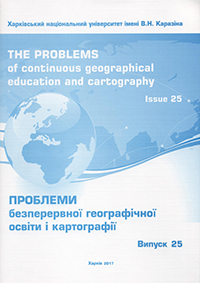Formation of tourist specialization students’ creative personality through individual and collective teaching
Abstract
The article states that due to the active development of tourism in Ukraine training in this area by European standards, principles and criteria becomes particularly relevant. The reform of Higher Education defines training of qualitatively new specialists, highly qualified professionals with a creative type of thinking, culture and citizenship as a priority. The author focuses on reviewing and analyzing aspects of methodological support regarding the combination of individual and collective forms of organization and training sessions, as well as balance of theory and practice. It is noted that at the initial stages of mastering new material is dominated by individual forms of work. This is explained by the need to make psychological and mental effort, to focus the students on study. Using a technique based on independent creative search activity, logical thinking, the construction of certain associations, identifying causal relationships develops the best cognitive activity of students. At the later stage collective learning is more effective for the active search of new knowledge after we consolidate the learned material. At this stage the knowledge of primary factual material of a given subject is not so important as the development of thinking, the ability to formulate and suggest a hypothesis to seek evidence for its solution and thus acquire new knowledge. The necessity to develop teaching methods for the course curriculum is based on innovations in organizing training sessions and is conducted in interactive forms. It has been found out that combination of individual and collective learning promotes the development of students’ personality, creative abilities, skills, readiness for active life position. A number of priority measures that influence the efficiency of educational process, quality training of future specialists for tourism industry have been analyzed.
Downloads
References
2. Kremen’, V.H., Il`yin, V.V/ (2012) Sy`nergety`ka v osviti: kontekst lyudy`nocentry`zmu: Monograf. [Synergetics in education context: humanocentrism; Monograph]. Ky’yiv: Pedagogichna dumka, 368.
3. Kul`tura i osvita faxivciv tury`sts`koyi sfery`: suchasni tendenciyi ta prognozy`(2005): Materialy` mizhn. nauk.- prakt. konferenciyi. [Culture and education in tourism areas: current trends and forecasts]. Ky’yiv: KUTEP, 656.
4. Novy`kova, V.I. (2006) Geografichne i kartografichne napovnennya students`ky`x tury`sts`ky`x regional`ny`x doslidzhen` [Geographical and cartography content of student tourism regional studies]. The problems of continuous geographical education and cartography, 6, 145.
5. Onkovy`ch, G. (2014) Naukova konferenciya, yak interakty`vna mediaosvitnya texnologiya [Scientific conference as interactive media-educational technology]. Higher education in Ukraine, 4, 85-93.
6. Tury`sty`chna osvita Ukrayiny` v yevropejs`komu vy`miri (2007): Materialy` mizhn. ukr.-pol. nauk. seminaru 21-24 travnya 2007 [Tourist education in Ukraine in European dimension]. Ivfno- Frankivs`k – Yaremche, 136.





